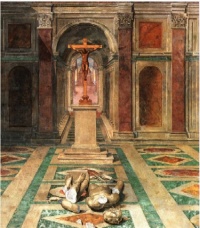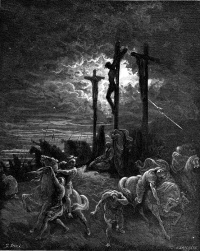Bible
From The Art and Popular Culture Encyclopedia
| Revision as of 14:40, 6 March 2018 Jahsonic (Talk | contribs) ← Previous diff |
Revision as of 20:24, 4 November 2023 Jahsonic (Talk | contribs) Next diff → |
||
| Line 1: | Line 1: | ||
| + | [[Image:Tommaso.Laureti.Triumph.of.Christianity.jpg|left|thumb|200px|This page '''{{PAGENAME}}''' is part of the [[Christianity]] series]] | ||
| + | [[Image:Crucifixion in Doré's English Bible.jpg|thumb|200px|right|''[[Doré's English Bible]]'']] | ||
| {| class="toccolours" style="float: left; margin-left: 1em; margin-right: 2em; font-size: 85%; background:#c6dbf7; color:black; width:30em; max-width: 40%;" cellspacing="5" | {| class="toccolours" style="float: left; margin-left: 1em; margin-right: 2em; font-size: 85%; background:#c6dbf7; color:black; width:30em; max-width: 40%;" cellspacing="5" | ||
| | style="text-align: left;" | | | style="text-align: left;" | | ||
| "Does the [[Bible]] come within the ruling of the Lord Chief Justice as to [[Obscenity|obscene literature]]? Most decidedly it does, and if prosecuted as an obscene book, it must necessarily be condemned, if the law is justly administered." --"[[Is the Bible Indictable?]]" (c. 1877), a pamphlet by Annie Besant | "Does the [[Bible]] come within the ruling of the Lord Chief Justice as to [[Obscenity|obscene literature]]? Most decidedly it does, and if prosecuted as an obscene book, it must necessarily be condemned, if the law is justly administered." --"[[Is the Bible Indictable?]]" (c. 1877), a pamphlet by Annie Besant | ||
| |} | |} | ||
| - | [[Image:Tommaso.Laureti.Triumph.of.Christianity.jpg|right|thumb|200px|This page '''{{PAGENAME}}''' is part of the [[Christianity]] series.<br><Small>Illustration: ''[[Triumph of Christianity]]'' (detail) by [[Tommaso Laureti]] (1530-1602.)</small>]] | ||
| {{Template}} | {{Template}} | ||
Revision as of 20:24, 4 November 2023

|
"Does the Bible come within the ruling of the Lord Chief Justice as to obscene literature? Most decidedly it does, and if prosecuted as an obscene book, it must necessarily be condemned, if the law is justly administered." --"Is the Bible Indictable?" (c. 1877), a pamphlet by Annie Besant |
|
Related e |
|
Featured: |
The word Bible refers to the canonical collections of sacred writings or books of Judaism and Christianity. The bible was the first mass produced book.
Contents |
Etymology
From Latin biblia, a collection of books (since there are many books in the Bible), eventually from the ancient Phoenician city of Byblos which exported this writing material.
Biblical criticism
Biblical criticism refers to the investigation of the Bible as a text, and addresses questions such as authorship, dates of composition, and authorial intention. It is not the same as criticism of the Bible, which is an assertion against the Bible being a source of information or ethical guidance, or observations that the Bible may have translation errors.
Higher criticism
In the 17th century Thomas Hobbes collected the current evidence to conclude outright that Moses could not have written the bulk of the Torah. Shortly afterwards the philosopher Baruch Spinoza published a unified critical analysis, arguing that the problematic passages were not isolated cases that could be explained away one by one, but pervasive throughout the five books, concluding that it was "clearer than the sun at noon that the Pentateuch was not written by Moses . . ." Despite determined opposition from Christians, both Catholic and Protestant, the views of Hobbes and Spinoza gained increasing acceptance amongst scholars.
See also
- Biblical inerrancy
- Biblical stories
- Bad women of the bible
- Illustrated bible
- Sex, Drugs, Violence and the Bible (2001) is a book by Chris Bennett and Neil McQueen
- Doré's English Bible (1866)
- Gutenberg Bible
- Religious text
- Biblical studies
- Biblia pauperum
- Code of Hammurabi
- Sola scriptura
- List of major biblical figures
Biblical topics
- Alcohol in the Bible
- Circumcision in the Bible
- Crime and punishment in the Bible
- Ethics in the Bible
- Murder in the Bible
- Slavery in the Bible
- Women in the Bible
- Summary of Christian eschatological differences


